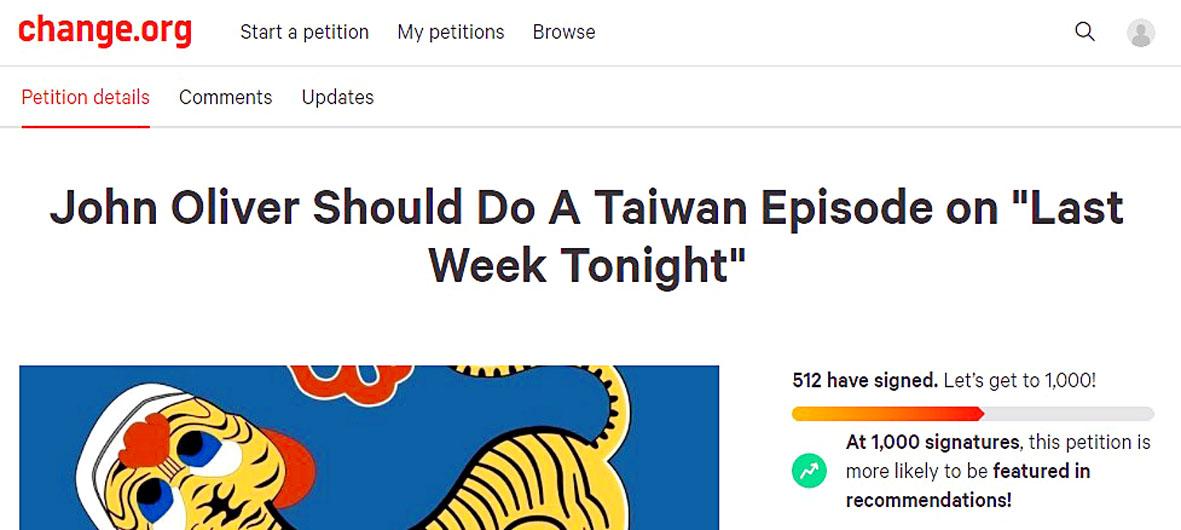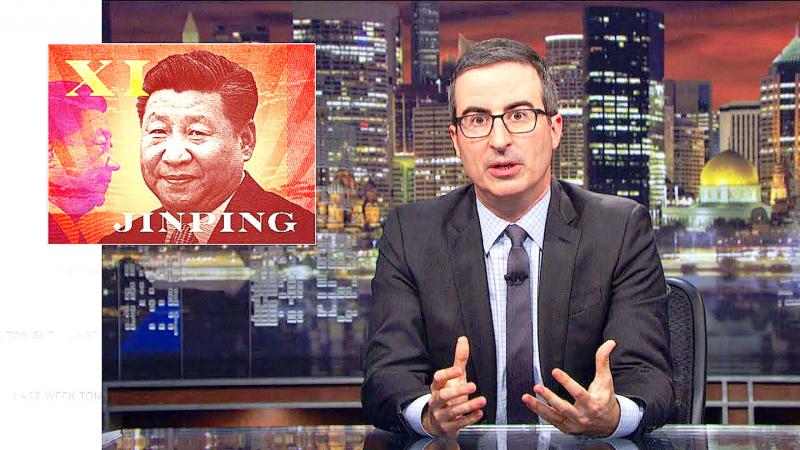British-American John Oliver roasted Chinese leader Xi Jinping (習近平) in 2018 and slammed China’s treatment of Uighurs in Xinjiang last year. Now some want him to do a segment on Taiwan.
More than 500 people have signed a petition launched last week asking Oliver to discuss Taiwan’s complex political situation and its international significance on his HBO show Last Week Tonight.
Jenna Cody, an American teacher-trainer and prolific blogger who has lived in Taiwan for 15 years, says she created the petition during a night of insomnia. Cody’s blog is quick to dispel one-sided or misinformed Western reports of the country, but she says the issue remains widely misunderstood.

Screen grab: Han Cheung, Taipei Times
“For a lot of us who write about Taiwan, I feel that our audience is just people who care about Taiwan,” Cody says. “It doesn’t feel like we’re getting any sort of general viewership. Taiwan makes it into the mainstream media, but it’s always through the China lens.”
Along with items such as unlimited term limits and detained activists, Oliver panned Chinese media censorship during his segment on Xi (where he also joked about comparisons with Winnie the Pooh). As expected, China reacted by blocking HBO and erasing Oliver from microblogging Web site Sina Weibo.
“Of all the late night comedy news shows, I feel that [Oliver] is probably the best person to take this on,” Cody says. “He’s willing to criticize China … a lot of those news guys don’t do that. He also tends to do in-depth things and I think Taiwan really needs an in-depth look. So I was up late and I thought, ‘Why don’t I pull a stunt and see if I can get something to happen?’”

Photo: screen grab from HBO’s Last week Tonight With John Oliver
Oliver typically spends 20 to 30 minutes doing a deep dive on a single topic in a sharply critical yet informative and humorous manner.
“He’s able to break down very serious issues in a way that keeps people’s attention,” Cody says. “His brand of humor can take something that people don’t think about or find boring … and make them realize that it is in fact very important.”
There are many angles to approach the Taiwan issue from, but Cody says that from her experience, foreign understanding of Taiwan is still low, and a general overview is needed.
“My grandma once asked me why I live here since it’s not a democracy,” she says. “So just letting people know that Taiwan is in fact independent and doesn’t want to be part of China is enough. A lot of people think because Taiwan calls itself the ROC [Republic of China], they assume Taiwanese think they are Chinese. It’s a lot of work on my part to quash that every time it comes up.”
Cody says that when she criticizes China in Taiwan, it’s usually apparent that she’s talking about the Chinese Communist Party. But in the US, people seem to project negative commentary onto the entire country, which has fueled anti-Asian sentiment across the nation.
Oliver has spoken out about racism in the past. In March, he railed against former US president Donald Trump and other politicians for calling COVID-19 the “China virus,” stating that doing so has led to an increase in violence against people of Asian descent. And two weeks ago he did a 27-minute, detailed segment on Asian Americans to contextualize their layered history and the model minority myth in light of current events.
“Looking at what he’s done recently, I think he would be able to handle the issue sensitively as well as correctly,” Cody says.
Cody adds that instead of just complaining about the vaccine situation, foreigners in Taiwan can help the situation by doing more outreach to people back home
“While not perfect, this is a country worth knowing about and fighting for,” she says. “You can do PR stunts, you can write your opinions, or just talk to your friends.”

Towering high above Taiwan’s capital city at 508 meters, Taipei 101 dominates the skyline. The earthquake-proof skyscraper of steel and glass has captured the imagination of professional rock climber Alex Honnold for more than a decade. Tomorrow morning, he will climb it in his signature free solo style — without ropes or protective equipment. And Netflix will broadcast it — live. The event’s announcement has drawn both excitement and trepidation, as well as some concerns over the ethical implications of attempting such a high-risk endeavor on live broadcast. Many have questioned Honnold’s desire to continues his free-solo climbs now that he’s a

The 2018 nine-in-one local elections were a wild ride that no one saw coming. Entering that year, the Chinese Nationalist Party (KMT) was demoralized and in disarray — and fearing an existential crisis. By the end of the year, the party was riding high and swept most of the country in a landslide, including toppling the Democratic Progressive Party (DPP) in their Kaohsiung stronghold. Could something like that happen again on the DPP side in this year’s nine-in-one elections? The short answer is not exactly; the conditions were very specific. However, it does illustrate how swiftly every assumption early in an

Francis William White, an Englishman who late in the 1860s served as Commissioner of the Imperial Customs Service in Tainan, published the tale of a jaunt he took one winter in 1868: A visit to the interior of south Formosa (1870). White’s journey took him into the mountains, where he mused on the difficult terrain and the ease with which his little group could be ambushed in the crags and dense vegetation. At one point he stays at the house of a local near a stream on the border of indigenous territory: “Their matchlocks, which were kept in excellent order,

Jan. 19 to Jan. 25 In 1933, an all-star team of musicians and lyricists began shaping a new sound. The person who brought them together was Chen Chun-yu (陳君玉), head of Columbia Records’ arts department. Tasked with creating Taiwanese “pop music,” they released hit after hit that year, with Chen contributing lyrics to several of the songs himself. Many figures from that group, including composer Teng Yu-hsien (鄧雨賢), vocalist Chun-chun (純純, Sun-sun in Taiwanese) and lyricist Lee Lin-chiu (李臨秋) remain well-known today, particularly for the famous classic Longing for the Spring Breeze (望春風). Chen, however, is not a name